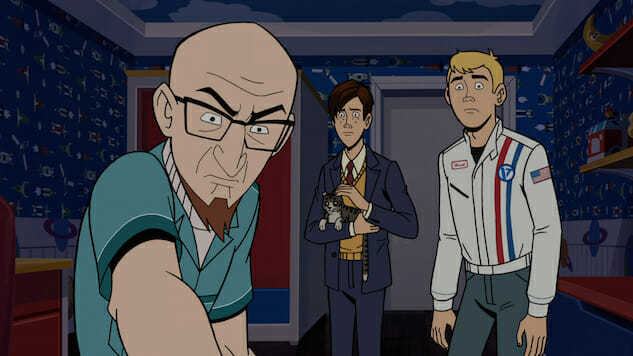How The Venture Bros. Brilliantly Blurs the Line Between Hero and Villain
Photo: Adult Swim
A 14-year mosaic of failure pegged to a Johnny Quest parody, The Venture Bros. works best when it dispenses with straightforward nefariousness and focuses on complex moral cross-sections: Heroes, like Dr. Venture (James Urbaniak), with unsavory sides; villains, like the Monarch (series co-creator Christopher McCullough), who show glimmers of valiance, and Dr. Venture’s newest archvillain, Wide Wale (Hal Hublin), who acts on emotional impulses rather than avarice or malice.
Okay: Maybe Wale acts a little out of malice in the recent Season Seven episode “The Rorqual Affair,” where, having captured the Monarch (in the guise of his alter ego, the vigilante Blue Morpho), strapped him to a chair, and beaten him bloody, he persuades Venture’s son, Hank (in the guise of his own alter ego, suave rogue Enrico Matasa), to lodge a bullet right between the Monarch’s eyes. Hank can handle danger. He’d storm the castle (read: Wale’s slick penthouse hideout) and dress up like a mobster to win the hand of his girlfriend, Sirena (Cristin Milioti), who’s also Wale’s daughter. What he can’t handle is murder, but that’s too damn bad. This is what you get when you’re the hero caught playing the part of villain, as so often happens on The Venture Bros., where the line separating the two has grown increasingly blurred over the series’ lifespan.
Consider the Monarch, once the very definition of “nemesis” (albeit whinier than you’d expect), whose side gig as the Blue Morpho sees him bumping off his fiendish peers in the Guild of Calamitous Intent. Taking out villains sounds like a net positive, but the Monarch’s scheme is in the service of a selfish goal: reclaiming his assignment arching Dr. Venture. (Call his stunts as the Blue Morpho a wash.) Plus, Dr. Venture himself is something of a monster, not the kind who leaves corpses in his wake but the petty, jealous kind who lacks self-awareness and doesn’t care about the ramifications of his actions. In the season opener, “The Curse of the Haunted Problem,” we see him at his most obstinate, refusing to accept that VenTech Tower is haunted and not stricken with a computer virus. That’s standard protocol for ol’ Rusty, though, in his defense, he turns out to be one-third right, one-third wrong, and one-third freaked the hell out.
Dr. Venture’s stubbornness makes him look more like an ass than a villain, even if his inaction forces his other son, Dean (Michael Sinterniklaas), to take charge. If you want to talk about real supervillainy, recall that once upon a time Dr. Venture grew clones of Hank and Dean in a garden of genetic horror the likes of which we’ll hopefully never see again. Maybe you would carbon copy your kids, too, if they were drawn to mortal peril like idiot moths to the flame and you had access to high-tech cloning hardware. All the same, this discovery painted Rusty as the mad-scientist type better than any other invention he’s come up with since. Not even Victor Frankenstein could top so profound an ethical lapse as that.
Dr. Venture’s amorality, Monarch’s self-centeredness, Wale’s vengeful designs, and Hank’s lack of circumspection make up one square in The Venture Bros.’ moral patchwork, in which identifying a meaningful difference between “hero” and “villain” is a fool’s errand. The Venture Bros. has plenty of traditional villains, bad guys motivated by bad intentions, bent on bad outcomes for their victims: The Investors, Monstroso, Phantom Limb, Zero a.k.a. Henchman 1, and so on. But these characters largely represent the traditions McCullough and Hammer mock through The Venture Bros.’ structure. The primary characters, and the supporting characters the series lassos into their path, reflect the show’s substance. At face value, The Venture Bros. is broad satire of two-fisted pulp stories from decades past, but under the hood, the engine driving the thing forward is a breakdown of the archetypes those pulp tales were built around.
-

-

-

-

-

-

-

-

-

-

-

-

-

-

-

-

-

-

-

-

-

-

-

-

-

-

-

-

-

-

-

-

-

-

-

-

-

-

-

-








































